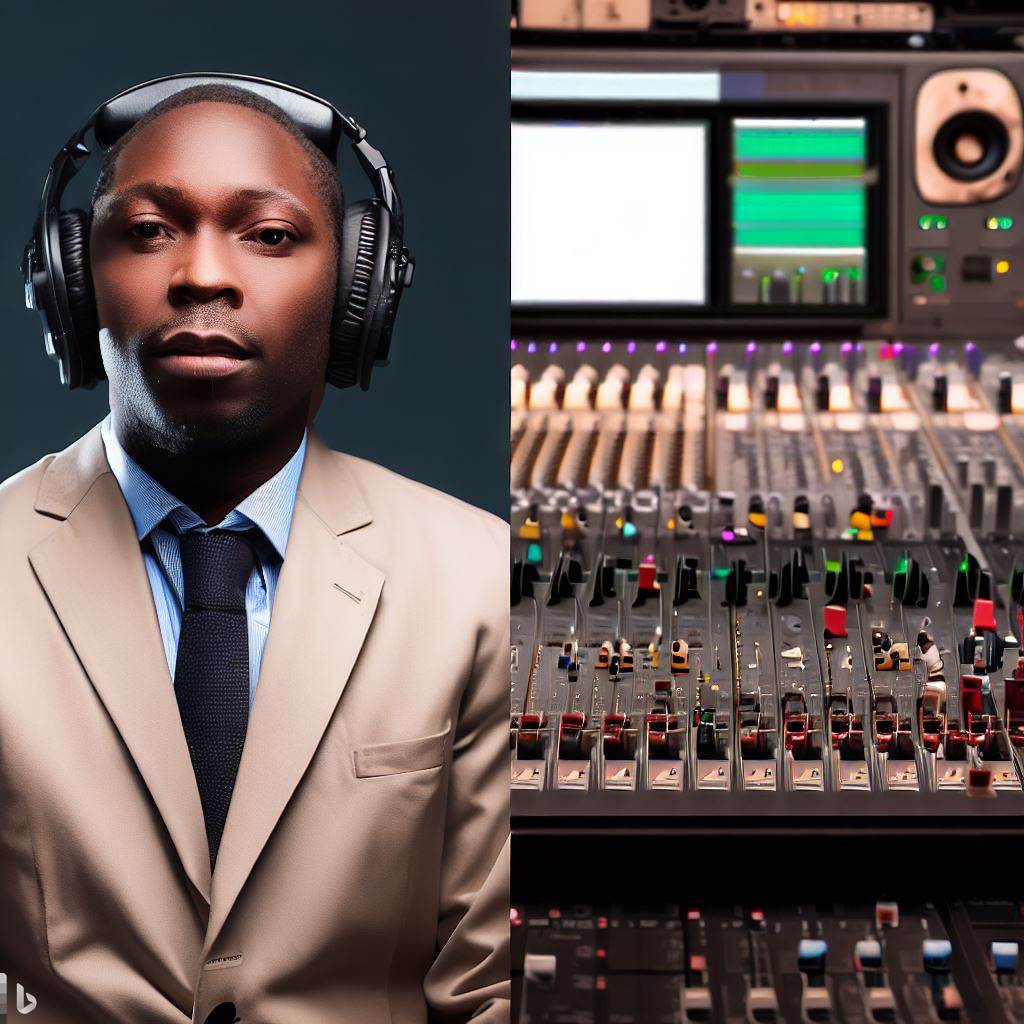Introduction
In this blog post, we will explore the importance of audio engineering in Nigeria’s music industry and the distinction between a mixing engineer vs mastering engineer.
Nigeria’s music industry has experienced significant growth over the years, with many talented artists emerging across various genres.
One crucial aspect of music production that contributes to the success of these artists is audio engineering.
Understanding the roles of each in music production is vital for creating high-quality music.
Role of a Mixing Engineer
Definition and purpose of mixing in music production
When it comes to music production, mixing is a critical process that brings all individual tracks together into a cohesive and balanced final product.
The purpose of mixing is to enhance the sonic elements of each track and create an enjoyable listening experience for the audience.
Responsibilities and tasks of a mixing engineer
A mixing engineer is responsible for a variety of tasks that contribute to the overall quality and appeal of a song. These tasks include:
- Balancing individual tracks: The mixing engineer ensures that each track in a song is audible and sits well within the mix. They adjust the volume levels of each element to achieve a harmonious balance.
- Adjusting volume levels and panning: In order to create a sense of space and dimension, the mixing engineer adjusts the volume levels and pans the tracks across the stereo field.
This gives the music depth and widens the soundstage. - Applying EQ, compression, and other effects: The mixing engineer utilizes equalization (EQ) to shape the frequency response of each track, ensuring that they complement each other.
Additionally, they employ compression to control the dynamic range and add other effects such as reverb and delay to enhance the sound. - Enhancing spatial and stereo images: To create a three-dimensional listening experience, the mixing engineer utilizes various techniques to enhance the spatial and stereo images.
This includes techniques like panning, stereo widening, and spatial effects. - Ensuring consistency across tracks: A key responsibility of the mixing engineer is to maintain consistency throughout the entire song.
They ensure that the instrumentation, vocals, and overall tonality match the artistic vision and sound cohesive.
In the end, the role of a mixing engineer in Nigeria’s music industry is crucial in creating a well-balanced and polished song.
They are responsible for blending individual tracks, adjusting volume levels, applying effects, and ensuring consistency across all tracks.
Without their expertise, the final product would lack the professional sound that listeners expect from their favorite artists.
Read: Behind the Sounds: Interviews with Top Nigerian Mixing Engineers
Skills and Expertise of a Mixing Engineer
Technical knowledge of audio equipment and software
- A mixing engineer must possess a deep understanding of various audio equipment such as mixing consoles, microphones, and audio interfaces.
- They should also be proficient in using different software applications for audio editing and processing.
- Having knowledge of the latest trends and advancements in audio technology is crucial for a mixing engineer.
Understanding of audio frequencies and how they interact
- A mixing engineer must have a strong grasp of audio frequencies and how they play together in a mix.
- They should be capable of identifying and addressing frequency imbalances and conflicts.
- By understanding the characteristics of different frequencies, a mixing engineer can create a balanced and pleasing sound.
Ability to communicate and collaborate with artists and producers
- A successful mixing engineer knows how to work effectively with artists and producers.
- They should possess excellent communication skills, ensuring clarity in exchanging ideas and feedback.
- Collaborating with others helps to achieve the desired artistic vision and enhance the overall production quality.
Attention to detail and critical listening skills
- A mixing engineer must pay meticulous attention to detail, ensuring that every element in the mix sounds perfect.
- They need to possess critical listening skills, able to detect even the slightest imperfections or sonic inconsistencies.
- This attention to detail and critical listening helps them achieve a polished and professional sounding mix.
Experience and ability to problem solve in challenging situations
- Being an experienced mixing engineer allows for familiarity with various challenges that may arise during the mixing process.
- They should have problem-solving abilities to overcome technical issues or creative obstacles.
- A skilled mixing engineer finds creative solutions and adapts to different genres and artist preferences.
In addition to these skills and expertise, mixing engineers must stay adaptable and keep refining their craft. The music industry is constantly evolving, and new techniques and technologies emerge regularly.
A successful mixing engineer stays updated with the latest trends and developments, attending workshops or conferences, and continuously learning.
Many mixing engineers also develop their unique style or sonic signature, which makes them stand out in the industry.
While technical proficiency is vital, having a distinct artistic touch can make a mix memorable and recognizable.
This artistic ability is often developed through years of experience, experimentation, and a deep understanding of various music genres.
Moreover, a mixing engineer must understand the emotional intent of a song and bring it to life through the mix.
They should be able to capture the mood and intention of the artist, enhancing the overall impact of the music on listeners. This requires empathy and the ability to connect with the artist’s vision.
In fact, becoming a skilled mixing engineer requires a combination of technical knowledge, critical listening skills, collaboration abilities, and problem-solving expertise.
It is a continuous learning process, staying updated with the latest trends while developing a unique artistic touch.
A proficient mixing engineer plays a crucial role in Nigeria’s music industry, shaping the sound and quality of each song.
Read: The Impact of Management on Nigeria’s Performers’ Success
Role of a Mastering Engineer
A mastering engineer plays a crucial role in the final production process of a music track, ensuring its quality, clarity, and consistency.
Let’s explore the definition, purpose, responsibilities, and tasks of a mastering engineer in the Nigerian music industry.
Definition and purpose of mastering in music production
Mastering is the final step in the music production process, where an experienced and skilled professional enhances the audio quality of a track before it is distributed.
It involves optimizing the overall sound of the music, transforming it into a coherent and polished final product.
The purpose of mastering is to make the music sound its best across different playback systems, such as car stereos, headphones, and club sound systems.
It helps achieve a consistent and balanced sound, enhancing its commercial viability and ensuring maximum impact on the listeners.
Responsibilities and tasks of a mastering engineer
- Finalizing the mix and preparing it for distribution: The mastering engineer carefully listens to the mix and makes necessary adjustments to achieve the desired sound quality.
- Balancing overall levels and EQ adjustments: The engineer ensures that all elements of the track, such as vocals, instruments, and effects, are well-balanced and blend harmoniously.
- Applying dynamic processing and stereo enhancement: Using various tools like compressors and limiters, the mastering engineer ensures that the track’s dynamics are controlled, and it sounds cohesive.
- Eliminating any sonic imperfections and enhancing overall clarity: They identify and address any sonic issues like clicks, pops, or unwanted noise, while also enhancing the clarity and definition of the track.
- Ensuring consistency across an entire album: If the track is part of an album, the mastering engineer ensures that the overall sound and loudness levels are consistent throughout the album.
A successful mastering engineer possesses a deep understanding of audio processing techniques, excellent listening skills, and a critical ear.
They use specialized equipment and software to achieve the desired sound while applying their technical expertise and artistic judgment.
Mastering engineers in Nigeria play a significant role in shaping the sonic landscape of the music industry.
Their contributions help artists and producers achieve a professional and polished sound that captivates listeners and stands out in a competitive market.
Read: Understanding the Creative Process of a Nigerian Mixing Engineer

Skills and Expertise of a Mastering Engineer
Mastering engineers play a crucial role in the final stage of music production.
They possess a unique set of skills and expertise that ensure the audio material is optimized for various playback mediums and meets industry standards.
Let’s delve deeper into the skills and expertise required by a mastering engineer.
In-depth knowledge of audio mastering techniques
To effectively master a track, a mastering engineer must have a profound understanding of various techniques like equalization, compression, stereo enhancement, and harmonic distortion.
They need to know how and when to apply these techniques to achieve the desired audio result.
Understanding of specific playback mediums and formats
Different playback mediums, such as CD, vinyl, and streaming platforms, have their own distinct characteristics and technical specifications.
A mastering engineer should be well-versed in these nuances to optimize the audio material for each medium.
Awareness of industry standards and trends
The music industry is constantly evolving, and it is essential for a mastering engineer to stay updated with the latest industry standards and trends.
This includes knowing the loudness requirements, digital delivery formats, and preferred tonal characteristics in different genres.
Enhanced critical listening abilities and an objective perspective
Critical listening skills are a fundamental requirement for a mastering engineer.
They must be able to identify subtle imperfections or areas that need improvement, whether it be excessive sibilance, muddiness, or unbalanced frequency response.
Maintaining an objective perspective during the mastering process is crucial to ensure the final product sounds optimal across various listening environments.
Experience in utilizing specialized mastering software and hardware
Mastering engineers work with specialized software and hardware designed specifically for audio mastering.
These tools enable precise control over the mastering process, allowing engineers to apply subtle adjustments to the audio material.
A mastering engineer should have hands-on experience in using these tools to achieve the desired sonic outcome.
In essence, a mastering engineer in Nigeria, or anywhere else, requires a combination of technical knowledge, critical listening skills, and experience to effectively optimize audio material for various playback mediums.
Their in-depth knowledge of audio mastering techniques, understanding of specific playback mediums and formats, awareness of industry standards and trends, enhanced critical listening abilities, and proficiency in utilizing specialized software and hardware make them essential in the music production process.
Read: Educational Pathways to Becoming a Mixing Engineer in Nigeria
Collaboration and Communication between Mixing and Mastering Engineers
Importance of clear and effective communication during the music production process
- Clear and effective communication is vital to ensure the successful outcome of a music production project.
- Through open communication, mixing and mastering engineers can understand the artist’s vision and goals.
- Regular communication allows for clarity regarding the specific requirements and expectations of the project.
- It helps in avoiding misunderstandings and ensures that both engineers are on the same page.
Establishing a collaborative workflow between mixing and mastering engineers
- Collaboration between mixing and mastering engineers is essential to achieve the best possible sound quality.
- A collaborative workflow involves a seamless exchange of ideas, techniques, and knowledge between the two engineers.
- They should work together to understand the artistic direction of the music and how to enhance it.
- This collaboration allows each engineer to contribute their expertise and skills to the project.
Providing necessary information and reference tracks for mastering engineer
- The mixing engineer should provide the mastering engineer with detailed information about the mix.
- This includes the desired sound, target audience, and any specific technical requirements.
- Reference tracks can also be shared to give the mastering engineer a clearer understanding of the artist’s intent.
- Through this information, the mastering engineer can make informed decisions to enhance the mix.
Utilizing feedback and revisions to achieve desired sound quality
- Feedback and revisions play a crucial role in the collaborative process between the mixing and mastering engineers.
- The mastering engineer should provide constructive feedback to the mixing engineer to address any issues.
- The mixing engineer can then make necessary revisions based on the feedback to improve the mix.
- This iterative process ensures that the final product meets the artist’s expectations and desired sound quality.
To sum it up, effective collaboration and communication between mixing and mastering engineers are essential for a successful music production process.
Clear communication helps in understanding the artist’s vision, while a collaborative workflow allows for the exchange of ideas and expertise.
Providing necessary information and reference tracks guides the mastering engineer in achieving the desired sound quality.
Utilizing feedback and revisions ensures that any issues are addressed, resulting in a final product that meets the artist’s expectations.
Conclusion
Mixing engineers are responsible for balancing and blending different audio elements, while mastering engineers focus on the final polishing and enhancing of the mixed tracks.
The roles of mixing and mastering engineers are crucial in ensuring the overall quality and competitiveness of Nigerian music in the global market.
By investing in professional audio engineering, artists and producers can elevate their music to a higher standard, resulting in better recognition and success in the industry.




